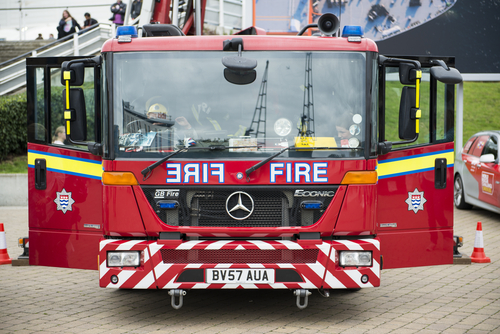Covid-19 shone a light on the Fire and Rescue Services’ (FRS) ability to react to a crisis. This article highlights how FRS helped nationwide during this time, and how their response has spring-boarded their vision for the future.
FRS Response During Covid-19
As Covid was fast approaching the UK, FRS were having meetings to discuss and agree upon a response plan should the pandemic have a similar effect in Britain as it had across the rest of the globe.
This led to a tri-partite agreement between the National Fire Chiefs Council (NFCC), Fire Brigades Union (FBU), and fire service national employers.
This agreement, known as The National Agreement, set out a framework detailing how firefighters could assist with the pandemic response.
Some of the agreed responsibilities included:
- Firefighters driving ambulances
- Moving dead bodies in case of mass casualties
- Supplying and delivering PPE
- Supplying emergency provisions to vulnerable people
FRS adopted the messaging: Ready, Willing, Able.
As of 9th February 2021, in carrying out these extra responsibilities and more, FRS had contributed massively to the response to Covid.
The figures below emphasise how FRS proved themselves to be ready, willing, and able to have a huge impact on the response:
- Assisted in taking 4119 antigen samples for testing
- Trained 276 non-FRS drivers to drive ambulances
- Delivered essential items to 139,942 vulnerable people
- Fitted 7969 face masks for frontline NHS staff and clinical care staff
- Supported ambulance service with 100,107 driving and personnel support
- Delivered 29049 unites of PPE and medical supplies
- Transferred 1466 known covid patients to and from hospital
- Packaged 45206 food parcels for delivery
- Assembled 68135 single use facemasks
- Delivered 1341 infection prevention and control training packages to care home staff
- Moved 5245 bodies
- Completed 3337 non-blue light ambulance journeys (non-Covid related)
Another impressive statistic from the pandemic is FRS absence rates. The highest they reached were 8% and are now down to as low as 2% of Covid-related absences.
Current Covid Responsibilities
FRS is carrying our regular lateral flow tests, with over 15,000 carried out within a three week period.
The National Agreement has been superseded by a range of other arrangements, which brings with it a number of new measures in keeping with the progress of the overall pandemic response.
This includes offering all ambulance-driving firefighters the vaccine in order to carry out this duty as safely as possible.

Not only will they receive the vaccine, but FRS is also helping with its rollout. As of February 2021, they were administering 1 in every 600 vaccines given. This totals over 25,000 vaccines.
They are also helping execute the logistics and marshalling of vaccination sites. Over 35 of the vaccination hubs across the UK have had FRS assistance in some form.
For the Future
FRS already help with a range of issues beyond the realms of fighting fires. Counter-terrorism, urban search and rescue, decontamination operations are some of the extra fields they offer expert help with.
Their stellar response to the pandemic has proved they can offer even more value in a wider range of roles.
This has been highlighted by an integrated review carried out by the government on national and local resilience. FRS shone through as a leading example throughout the review.
In preparing for the future, FRS has laid out their strategic objectives:
- Evidence based risk planning
- Focus on improving competence
- National standards and guidance
- Innovative approaches to prevention
- Evolved role of protection
- Measuring benefits and evaluating activity
Evidence-based risk planning
A move away from financially budgeted plans that are dictated by resource capacity and instead draw upon evidence, data, and the actual capability of those carrying out the services.
Their risk planning has a focus on responsiveness and flexibility, based on the evidence and data available, of which the Covid response has provided a strong base for them to draw upon.
Focus on Improving Competence
Building on the strong reputation of competency, this objective centres around showing greater value.
The vast range of operations FRS are involved in, whether it be the handling of dangerous chemicals or difficult rescue situations, growing and constantly improving is a key goal.
National Standards and Guidance
A focus on localism has meant operational standards across the UK vary. In the future, providing nationwide guidance that can act as a benchmark will look to improve overall standards across all FRS.
Innovative Approaches to Prevention
Reducing deaths from fires is of course the main objective of FRS and continuing to innovate prevention methods is forming the basis of their plan to further reduce fires and injuries.
Evolved Role of Protection
Post-Grenfell, the extent of the failings of a wide range of institutions has been closely scrutinised. The ineptitude has gone as far as being classed as criminal.
FRS believe their role in stopping tragedies such as this repeating themselves goes beyond being a responsive unit but has more of an influence in the wider conversation around building and fire safety measures.
Measuring Benefits and Evaluating Activity
In preventing fires, measuring something that didn’t happen is very difficult.
The measurement of success has been very task orientated, and not a reflective process.
Going forward FRS will look at how they can better display their value and evaluate their performance.
Employing for the Future
FRS are looking to improve their recruitment and retention of a more diverse workforce.
Addressing the culture towards female workers, as well as those from minority backgrounds are making up part of the initiative to drive more diversity across services.
Alongside this effort, FRS want to inspire effective leadership throughout the workforce. This is to be done by highlighting every single member of the service as a leader and encouraging each worker to grow into their role.
In creating a culture of inclusion and promoting effective leadership, there is also a desire to turn away from the competitive nature of fire departments.
By nurturing a more collaborative approach, both with other agencies such as the police force and health care services, as well as within the FRS itself, it is hoped that the service provided by all will be improved.
Tying into this, there is a shifting emphasis on organisational learning. When a large scale incident occurs, it is important to evaluate not only the social outcomes but also how it affects staff.
This has led to progress in discussions surrounding the mental health of workers and wellbeing programs are part of this broader cultural shift spearheading the future direction of FRS.
Finally, there is to be a greater focus on data and the digital world. By embracing the digital world it can help spread the messaging of FRS to a wider audience, as well as utilising data to better prove its value.
[1] Wilsher, Roy. 2021. Preparing for the Future of Fire and Rescue Services.
Register FREE to access 2 more articles
We hope you’ve enjoyed your first article on GE Insights. To access 2 more articles for free, register now to join the Government Events community.
(Use discount code CPWR50)




